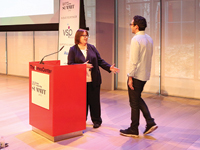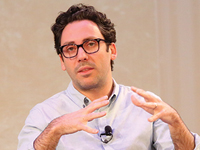 | |
Vision Monday's Marge Axelrad welcomed surprise guest, Warby Parker's Neil Blumenthal, to the stage.
| |
| | |
 | |
"An articulated mission of caring has a bigger impact on the bottom line," said Warby Parker co-founder, Neil Blumenthal, about the company's Buy-One-Give-One policy.
| |
| | |
 | |
"We are living in a time of disruption," and disrupters "are going to change the world whether the world wants to change or not," said Inc. editor, James Ledbetter.
| |
| | |